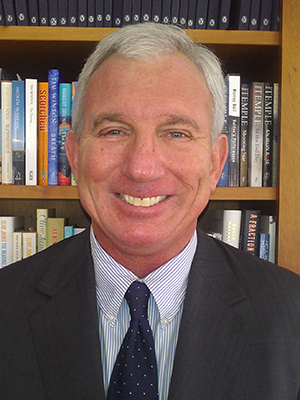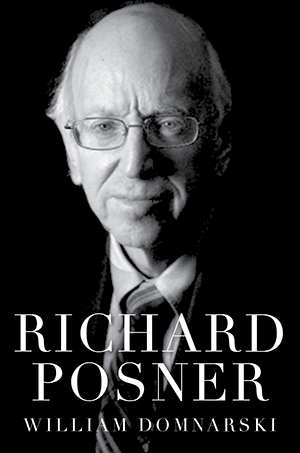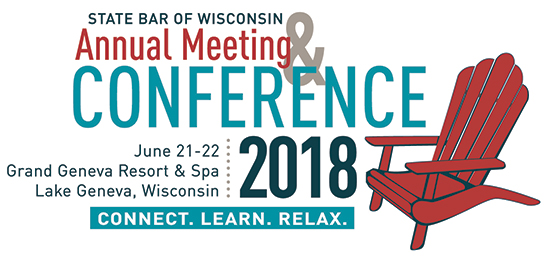 June 6, 2018 – In his latest book, lawyer and author William Domnarski goes deep into the life, times, and writing of former Seventh Circuit Court of Appeals Judge Richard Posner, a well-known legal scholar with a reputation for great writing.
June 6, 2018 – In his latest book, lawyer and author William Domnarski goes deep into the life, times, and writing of former Seventh Circuit Court of Appeals Judge Richard Posner, a well-known legal scholar with a reputation for great writing.
“More than anything else, Posner is a writer. He happens to be a judge and an academic. But he’s a writer. That’s what he is,” said Domnarski.
At the State Bar of Wisconsin’s Annual Meeting and Conference, June 21-22, in Lake Geneva, Domnarski will sit down with someone who knows Judge Posner very well: Seventh Circuit Chief Judge Diane Wood. Domnarski, skilled at the art of interview, will certainly prod Chief Judge Wood, whose court has undergone major changes.
“She has three new judges coming in, so I want to ask how that may affect the relations of the court,” said Domnarski, referring to the newest members of the court: Michael Brennan, Michael Scudder, and Amy St. Eve – all appointed by President Trump and confirmed last month. Amy Barrett, another Trump appointment, was confirmed in 2017.
“I’m also trying to help lawyers understand more about what works and doesn’t work at the appellate level,” said Domnarski, who has practiced law for 40 years. “So, I’m trying to get lawyers to see more of what judges see. I imagine she will be very candid about things that she likes and doesn’t like about oral argument, for instance.”
The Storyteller
Domnarski, a prolific writer based in California, has published numerous books about judges. His first book, In the Opinion of the Court (1996), examines judicial opinions as a literary genre, exploring the writings of such judges as Learned Hand and Oliver Wendell Holmes.
 Joe Forward, Saint Louis Univ. School of Law 2010, is a legal writer for the State Bar of Wisconsin, Madison. He can be reached by email or by phone at (608) 250-6161.
Joe Forward, Saint Louis Univ. School of Law 2010, is a legal writer for the State Bar of Wisconsin, Madison. He can be reached by email or by phone at (608) 250-6161.
His second book, The Great Justices (2009), considers the careers of U.S. Supreme Court Justices Hugo Black, William Douglas, Felix Frankfurter, and Robert Jackson.
“Jackson had played poker with the President [Roosevelt], and Frankfurter had been an unofficial advisor to the President. So they both got put on the court as liberals,” he said.
“And they were for a brief time, and then they found out that they couldn’t control the court,” Domnarski explained. “It was clear to me that Jackson and Frankfurter had adopted ideological positions based on spite, which I thought was really interesting.”
His third book, Federal Judges Revealed (2009), considers the oral histories of Article III judges. And his fourth book, Swimming in Deep Water, is a collection of essays about the legal profession. In “perilous times,” it explores how the profession must change.
For his most recent book, Richard Posner (2016), Domnarski obtained Judge Posner’s cooperation for an in-depth glimpse of his personality. “In the past half-century, there has been no figure more dominant or more controversial in American law than Posner,” wrote John Witt at the New York Times, in a book review of Domnarski’s biography.
In what follows, Domnarski details the process in writing his latest book and discusses the “great writers” in law, including Posner, who abruptly retired last year.
How did you learn about Judge Posner?
I started writing a book in the 1990s on judicial opinions because I was fascinated and interested in judges as writers, mostly because I’m interested in writing, but I was particularly curious about writing and the law because lawyers can’t write about law in their briefs. They are just advocates. The only people who can write about law are judges. So I started looking at the good writers and ended up writing about Holmes and some other people. And I stumbled across Bruce Selya, who was a federal district judge in Rhode Island [Domnarski was in Connecticut at the time]. He’s on the court of appeals now. He was a remarkable writer, and he really stirred my interest in this idea of judges taking this world of law and trying to make sense of it for an audience.
Then I stumbled across the writing of Richard Posner. I subscribed to the federal reporter, and every week it would come in and I would flip through it, partly just to educate myself. And his opinions always jumped off the page. You could tell just by glancing at them that he was taking this different approach to writing opinions. In my first book I did a chapter on Posner and tried to argue that he was reshaping the genre. And he was. He was the first and only to take that approach. So we became friends because I corresponded with him and would see him whenever I was in Chicago.
So how did you pitch Judge Posner on the most recent book?

For his most recent book, Richard Posner (2016), William Domnarski obtained Judge Posner’s cooperation for an in-depth glimpse of his personality.
I just told him that someone should write about him because he didn’t want to be in the position of Henry Friendly, who didn’t get a biographer for 25 years. By that time, all the people who knew Friendly as a kid, as a law student, as a young practitioner – they were all gone. His biographer, David Dorsin, had some good resources. He combed the Harvard archive of Friendly very effectively and came up with a lot of good stuff. But it didn’t have what the reader really wants, which is the impressions, anecdotes, and descriptions of Henry Friendly as he became Henry Friendly. So, I thought that unless someone wrote about Posner in that way, it was going to be lost.
I sent him an email because we were corresponding fairly frequently, and I just said that, asked if he would be okay with that, asked if he would cooperate. I thought cooperation was an important thing. Over the years, he told me lots of things about his life. But I didn’t think it was fair to use those. I wanted to get conversations on the record. So he agreed to cooperate, which meant a couple of things.
It meant that he would sit down and I would get him on the tape recorder, which I did. Hours and hours. I visited Chicago, probably 10 times for these conversations. One day he told me he had these things and asked if I wanted to look through them. And there were three boxes of what you would call childhood memorabilia. It was fabulous. I am one of the few people who can say ‘I have seen the baby pictures.’ One of the best things in the book involves his teachers talking about a young Posner in his evaluations. And I would ask him questions about his youth and going to school.
Another part of cooperation was he gave me unrestricted access to his archive at the University of Chicago, which was made up of about 226 boxes. There was a lot of stuff that he may have forgotten that he put in there, all his personal correspondence. People would write to him. He had correspondence with Martha Nussbaum, who later became a University of Chicago faculty law professor. She was really something.
She would write him these letters on all these different topics and just gave Posner this platform to show how smart he was and reveal his personality. The book has some great stuff in there about his personality, and to his credit, he never told me not to use it. The University of Chicago also allowed me to use my camera phone to capture the pages I wanted, so I ended up with about 1,500 pages from 10 days in the archive. Otherwise, it would have been a year-long project to copy all that.
He had some fabulous stuff in the archive. In 1999, he was appointed to try and mediate the dispute between Microsoft and the government. The case was tried in D.C., and the judge there understood that he needed to get some powerful influence to try and get the thing settled. So he asked Dick if he would mediate. He said yes and the parties agreed. So he had this file on the mediation, and it was fabulous because it showed him at work, which is to say, how he solved or tried to solve this problem.
But what the book is about is Posner's personality. To his credit, there are things that are revealing about his sense of self. He says some extraordinary things: things that when I read them in the library, I just said 'oh my god.' Because they were so revealing about his personality. And these other letters that I found when he was an academic were fabulous also because they showed him creating this law and economics thing that he became the owner of, in a way. He was proselytizing. The whole decade, he was trying to convince the world that law and economics was the way to go. In fact, I was able to find stuff from the archive about his first book, The Economic Analysis of Law. There was all this revealing stuff. It just shows him at work as a judge and as a writer.
How do you define a judge as a great writer? What sets the great ones apart?
That’s a really good question, because there are different levels of good writing. There are people who have a certain facility with the language, I guess you would say. An example of that is [Antonin] Scalia. Scalia was a fine writer, but he didn’t have any depth. He was an angry man, I thought. In fact, I’m trying to write a book right now about angry judges, and it’s mostly about him.
So he’s an angry judge, and he uses a vituperative approach. He just screams at all his colleagues and says nasty things about them, which is eye-catching and certainly makes for lots of conversations. I don’t know, in the end, how effective it is, because I don’t think he persuaded anybody. He wasn’t like Posner, he wasn’t like Holmes. Even Jackson was a great reader and a very deep writer. These are people who are able to touch the world of literature, the imaginative world, and use it to explain how law works.
That’s one of the great things about Posner and the thing that really attracted me to his writing. I tried – first in my book in the 1990s, and now this book – to show this connection between this world of literature and his understanding of how law works.
I think I did a pretty good job because I had read everything a couple of times, actually in some instances three times, all of his opinions, and there were 3,000 so it took a while, but I tried to really cull out of that stuff for examples of him at work with this mind that connects both law and literature.
There are people who are good writers. They are fluid, and graceful. There are a certain number of them around. But that’s just good writing. I’m not even sure that’s writing that can be produced by good editing, but good writing is not of the sort that the great writers write.
The great writers understand things both in the abstract and the concrete world. Posner was one of those, Holmes was one of those, Jackson. Friendly was a very fine writer and a very learned man. When I say “learned,” I mean people who are steeped in history and philosophy and all those things that make up the humanistic palate.
These are people who happened to be judges. If Posner and Friendly didn’t happen to be judges, same thing with Holmes, they would be another type of writer because that was in their blood. So anyway, I tried to bring that out in the book about Posner.
Don't Miss Other Featured Speakers at the Annual Meeting and Conference

Domnarski and Chief Judge Diane Wood of the Seventh Circuit Court of Appeals will sit down for a morning chat on Friday, June 22, at 8 a.m. at the State Bar’s 2018 Annual Meeting and Conference at the Grand Geneva Resort in Lake Geneva.
Other featured AMC speakers include Richard Painter, law professor and former chief ethics advisor to President George W. Bush (he’s also a candidate for U.S. Senate-Minnesota), attorney Dana Tippin Cutler, the first African-American woman to serve as president of The Missouri Bar (2016-17), and political satirist and writer P.J. O’Rourke.
Check out the schedule at-a-glance, which includes a listing of social activities that will take place as attendees earn up to 12 CLE credits. Or just register now!
Related Articles
